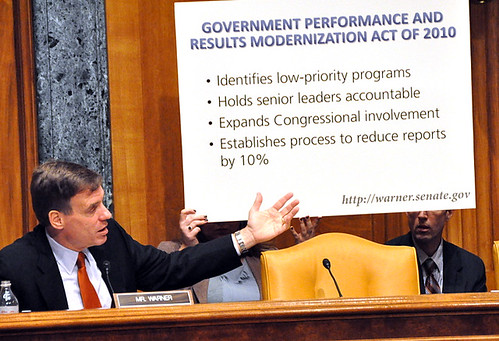Press Releases
Senate Budget Task Force holds hearing on government duplication & inefficiency
Task force hears from GAO's Dodaro, former White House Chief of Staff Podesta
Mar 16 2011
Senator Warner, chairman of the Senate Budget Committee's bipartisan Task Force on Government Performance, convened a hearing today on duplicative and inefficient federal programs that included testimony from GAO Comptroller General Gene Dodaro, Center for American Progress president and former Clinton White House chief of staff John Podesta, and former Bush Administration Associate OMB Director Robert Shea. Video and other materials from today’s hearing are available here.
More photos are available at our Flickr site.
On Jan. 4, 2011, the President signed into law the Government Performance and Results Modernization Act of 2010, of which Sen. Warner was a lead sponsor. GPRA requires each federal agency to identify their top priorities, publicly report program results, and identify ineffective and overlapping federal programs for possible consolidation or elimination.
“This Task Force has been focused on these issues for over a year, and the legislation we passed last year will provide much needed new information to address the overlap and duplication,” said Sen. Warner. “This new law upgrades and modernizes our existing framework in important ways, and now we’ve got to make sure we get the implementation right.”
A March 1, 2011, GAO report on program overlap and duplication further highlighted the need for GPRA, a point that GAO’s Dodaro emphasized in his testimony on Wednesday.
“Addressing [our] fiscal challenges will require action on several fronts,” Dodaro said. “All federal programs and activities – discretionary programs, mandatory spending, revenues and tax expenditures – need to be reexamined. Second, program structures that are outmoded, overlapping, duplicative, fragmented, and not up to the challenges of the times must be reformed or restructured…. Moving forward, the GPRA Modernization Act can offer opportunities to help make tough choices in setting priorities as well as reforming programs and management practices to better link resources to results.”
“Government reform efforts fail when Congress is not invested and we lose focus. That’s why your leadership and the work of this task force are so important, and that’s why the passage of the GPRA Modernization Act is so significant,” said Podesta, of CAP. “Congress and the executive branch will have to make smart decisions about where to make cuts so that we continue to see growth and job creation while bringing down our long-term deficits. This requires … a scalpel, not a hatchet.”
“Like the performance management initiatives before them, the GPRA Modernization Act is an important milestone in our never-ending quest to make government more efficient and effective,” testified Robert Shea, principal with Grant Thornton and a former Office of Management and Budget associate director who led the Bush Administration’s government performance initiative. “Assigning accountability for improved performance and outlining transparency requirements can go a long way toward improving program success. Without active, persistent oversight from Congress and the executive branch, progress will be sporadic and fleeting. Without strong and experienced leaders, progress may be limited, if not impossible.”
In addition to Sen. Warner, members of the Task Force on Government Performance include Sens. Sheldon Whitehouse (D-RI), Ben Cardin (D-MD), Mike Crapo (R-ID) and John Thune (R-SD). Budget Committee Chairman Kent Conrad (D-ND) and Ranking Member Jeff Sessions (R-AL) serve as ex officio members.
